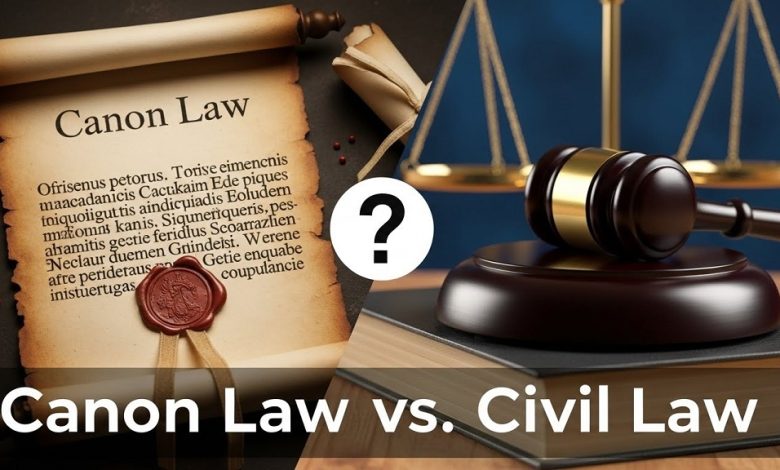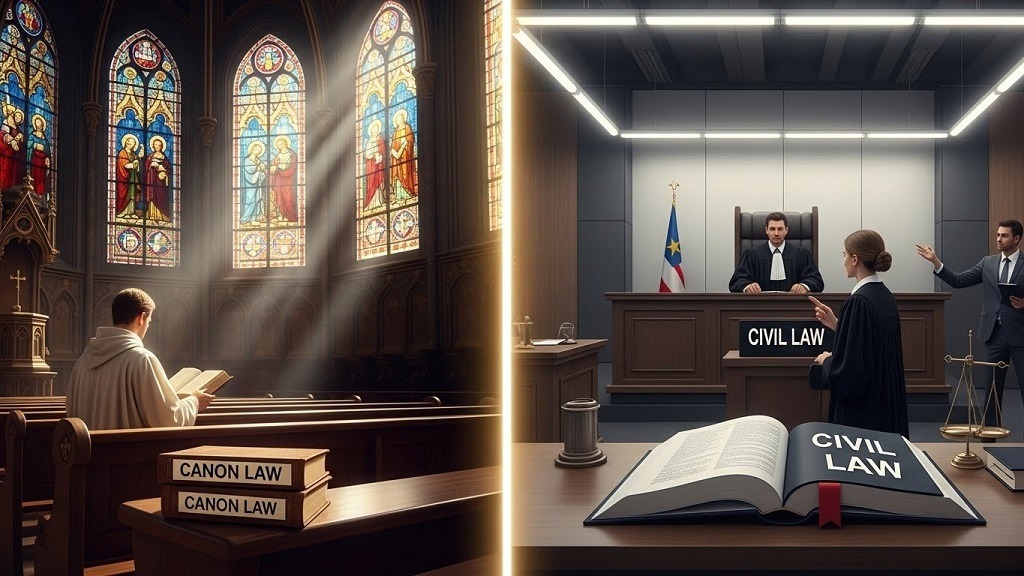What Is the Difference Between Canon Law and Civil Law?

Canon law is the Catholic Church’s internal legal system.
It sets rules for doctrine, worship, sacraments, church governance, church property, and the rights and duties of the faithful.
What is civil law?
Civil law is the legal system created and enforced by the state.
It covers areas like contracts, property, family law, crime, taxation, and how public authorities operate.
Core Difference Between Canon Law and Civil Law
Who each system governs
-
Canon law governs members and institutions of the Catholic Church.
-
Civil law governs everyone and everything under a state’s jurisdiction, regardless of religion.
This is why the difference between canon law and civil law is partly about membership and partly about jurisdiction.
What each system is trying to achieve
-
Canon law aims at the spiritual good of the faithful and the proper order of Church life.
-
Civil law aims at social order, public safety, and protection of rights in society.
Canon Law vs Civil Law at a Glance
Key comparison table
| Aspect | Canon Law (Ecclesiastical) | Civil Law (State) |
|---|---|---|
| Community | Catholic Church (clergy, religious, laity) | All persons and entities in a country |
| Source of authority | Scripture, tradition, papal and episcopal authority | Constitution, statutes, regulations, case law |
| Main codes | Code of Canon Law; Code of Canons of Eastern Churches | Civil codes, criminal codes, procedural codes, etc. |
| Purpose | Salvation of souls, order of Church life | Public order, rights protection, justice in society |
| Courts | Ecclesiastical tribunals (diocesan, Roman Rota, Signatura) | State courts and administrative bodies |
| Sanctions | Spiritual and disciplinary penalties, loss of office | Fines, imprisonment, damages, injunctions |

This table quickly shows the ecclesiastical law vs civil law contrast in purpose, scope, and enforcement.
Sources of Authority and Legal Logic
How canon law is made
In canon law:
-
The Pope can issue universal laws for the whole Church.
-
Bishops and bishops’ conferences can issue particular laws for their dioceses or regions.
-
All of this is understood in light of Scripture, tradition, and long‑standing Church practice.
How civil law is made
In civil law:
-
Legislatures pass statutes.
-
Governments issue regulations.
-
Courts interpret and apply these rules in specific cases.
Some countries rely mostly on written codes; others lean heavily on judicial decisions. Either way, authority comes from the political order, not from religious revelation.
Courts, Procedures, and Enforcement
Ecclesiastical courts under canon law
Ecclesiastical courts handle internal Church matters such as:
-
Marriage nullity cases (annulments).
-
Disputes about church offices or discipline.
-
Administration of church property.
These tribunals follow formal procedures, but their remedies are spiritual or institutional: declarations, dispensations, and ecclesiastical penalties rather than prison or state fines.
State courts under civil law
Civil courts handle:
-
Criminal prosecutions.
-
Contract and property disputes.
-
Family law cases like divorce and custody.
-
Administrative law disputes involving government decisions.
Their decisions are backed by the state’s power: they can order payment of money, authorize seizure of assets, or impose imprisonment.
Canon Law and Civil Law Examples
Marriage
One of the clearest canon law and civil law examples is marriage:
-
A couple might be validly married in civil law but invalid in canon law if canonical form was not followed.
-
A Church annulment addresses the sacramental bond, not the civil status or property division.
Church property and contracts
Another practical example:
-
A diocese is a “juridic person” in canon law and often a non‑profit corporation in civil law.
-
A property sale must follow canon law rules (for permissions and safeguards) and civil law rules (for deeds, registration, tax, and zoning).
This dual structure explains why Church leaders often consult both canon lawyers and civil lawyers.
Where Ecclesiastical Law and Civil Law Overlap
When canon law refers to civil law
Canon law sometimes adopts civil norms, especially in areas like:
-
Contracts.
-
Ownership and administration of temporal goods.
-
Certain procedural matters.
This only happens when civil law does not conflict with divine law or explicit Church rules.
When civil law touches Church life
Civil law can affect:
-
Employment and labor standards in Catholic institutions.
-
Health and safety rules in churches and schools.
-
Child‑protection, reporting obligations, and education law.
Even then, the state usually avoids deciding purely theological or internal religious questions.
Why the Difference Matters Today
For Catholics and Church workers
Understanding the difference between canon law and civil law helps Catholics know:
-
Which questions belong to a parish, diocese, or tribunal.
-
Why a Church process (like an annulment) is different from a civil process (like a divorce).
-
Why Church leaders sometimes say, “We must do this because canon law requires it,” even when civil law is silent.
For lawyers and administrators
For lawyers, school leaders, and diocesan staff, the distinction is critical:
-
Policies and contracts must comply with both systems.
-
Failing to follow canon law can harm the Church’s mission or validity of acts.
-
Ignoring civil law can bring serious legal and financial risk.
FAQs About Canon Law and Civil Law
Is canon law legally binding?
Canon law is binding within the Catholic Church on those subject to it, such as Catholics, clergy, and Church entities. It is not enforced by the state, but it is taken seriously in Church governance and sacramental life.
Does civil law ever recognize canon law?
Sometimes civil law recognizes internal Church decisions, like membership or governance, as long as that recognition does not conflict with public policy. Formal agreements (concordats) in some countries regulate this cooperation.
What if canon law and civil law conflict?
A Catholic can face different duties in each system. The Church teaches respect for legitimate civil authority, but it also insists that no law may force someone to act against divine law or conscience.
Do I need a canon lawyer or a civil lawyer?
It depends on your issue:
-
For annulments, internal Church disputes, or religious vows, a canon lawyer is the right person.
-
For contracts, employment, taxes, property, or criminal issues, you need a civil lawyer.
-
In complex cases involving both, you may need both specialists.
Clear Call to Action (CTA)
If you work with a parish, school, or Catholic organization, now is the time to check whether your policies, contracts, and structures respect both canon law and civil law. Start by:
-
Listing your key legal documents (statutes, bylaws, property deeds, contracts).
-
Asking whether each has been reviewed from both a canonical and civil perspective.
-
Reaching out to a qualified canon lawyer and a local civil lawyer to close any gaps.
This simple audit can protect your community, strengthen your governance, and ensure that your mission is carried out faithfully and lawfully.
Related Topics: How businesses can handle data overload
Related Topics: Ergonomic Nursing Support: Relieving Back Pain During Feedings

